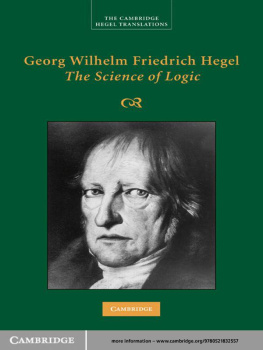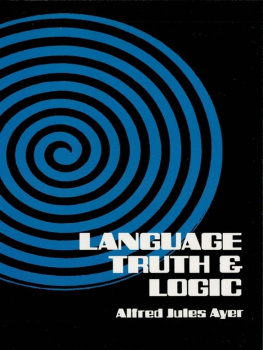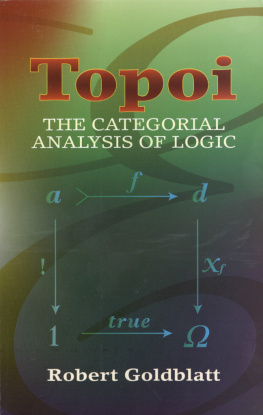Stebbing - Analysis of Mills System of Logic
Here you can read online Stebbing - Analysis of Mills System of Logic full text of the book (entire story) in english for free. Download pdf and epub, get meaning, cover and reviews about this ebook. genre: Science. Description of the work, (preface) as well as reviews are available. Best literature library LitArk.com created for fans of good reading and offers a wide selection of genres:
Romance novel
Science fiction
Adventure
Detective
Science
History
Home and family
Prose
Art
Politics
Computer
Non-fiction
Religion
Business
Children
Humor
Choose a favorite category and find really read worthwhile books. Enjoy immersion in the world of imagination, feel the emotions of the characters or learn something new for yourself, make an fascinating discovery.
Analysis of Mills System of Logic: summary, description and annotation
We offer to read an annotation, description, summary or preface (depends on what the author of the book "Analysis of Mills System of Logic" wrote himself). If you haven't found the necessary information about the book — write in the comments, we will try to find it.
Analysis of Mills System of Logic — read online for free the complete book (whole text) full work
Below is the text of the book, divided by pages. System saving the place of the last page read, allows you to conveniently read the book "Analysis of Mills System of Logic" online for free, without having to search again every time where you left off. Put a bookmark, and you can go to the page where you finished reading at any time.
Font size:
Interval:
Bookmark:
The Project Gutenberg EBook of Analysis of Mr. Mill's System of Logic, by
William Stebbing
This eBook is for the use of anyone anywhere at no cost and with
almost no restrictions whatsoever. You may copy it, give it away or
re-use it under the terms of the Project Gutenberg License included
with this eBook or online at www.gutenberg.org
Title: Analysis of Mr. Mill's System of Logic
Author: William Stebbing
Release Date: January 6, 2010 [EBook #30866]
Language: English
*** START OF THIS PROJECT GUTENBERG EBOOK MILL'S LOGIC ***
Produced by David Clarke, Martin Pettit and the Online
Distributed Proofreading Team at http://www.pgdp.net (This
file was produced from images generously made available
by The Internet Archive/Million Book Project)
Transcriber's Note:
Greek characters that may not display correctly in all browsers are followed by a transliteration.
M.P. FOR WESTMINSTER.
A SYSTEM of LOGIC, RATIOCINATIVE and INDUCTIVE. Sixth Edition. 2 vols. 8vo. 25s.
An EXAMINATION of SIR WILLIAM HAMILTON'S PHILOSOPHY, and of the Principal Philosophical Questions discussed in his Writings. Third Edition, revised. 8vo. 14s.
PRINCIPLES of POLITICAL ECONOMY, with some of their Applications to Social Philosophy. Sixth Edition. 2 vols. 8vo. 30s.
PRINCIPLES of POLITICAL ECONOMY. By John Stuart Mill , M.P. People's Edition. Crown 8vo. 5s.
CONSIDERATIONS on REPRESENTATIVE GOVERNMENT. Third Edition. 8vo. 9s.
On REPRESENTATIVE GOVERNMENT. By John Stuart Mill , M.P. People's Edition. Crown 8vo. 2s.
On LIBERTY. Third Edition. Post 8vo. 7s. 6d.
On LIBERTY. By John Stuart Mill , M.P. People's Edition. Crown 8vo. 1s. 4d.
DISSERTATIONS and DISCUSSIONS, POLITICAL, PHILOSOPHICAL, and HISTORICAL. Second Edition of Vols. I. and II. price 24s.; Vol. III., price 12s.
INAUGURAL ADDRESS delivered to the University of St. Andrew's, Feb. 1, 1867. By John Stuart Mill , M.P. Rector of the University. Library Edition (the Second), post 8vo. 5s. People's Edition, crown 8vo. 1s.
UTILITARIANISM. Second Edition. 8vo. 5s.
THOUGHTS on PARLIAMENTARY REFORM. Second Edition, with Supplement . 8vo. 1s. 6d.
London: LONGMANS and CO. Paternoster Row.
LONGMANS, GREEN, AND CO.
1867.
LONDON
PRINTED BY SPOTTISWOODE AND CO.
NEW-STREET SQUARE
The author's aim has been to produce such a condensation of the original work as may recall its contents to those who have read it, and may serve those who are now reading it in the place of a full body of marginal notes. Mr. Mill's conclusions on the true province and method of Logic have a high substantive value, independent even of the arguments and illustrations by which they are supported; and these conclusions may be adequately, and, it is believed, with much practical utility, embodied in an epitome. The processes of reasoning on which they depend, can, on the other hand, be represented in outline only. But it is hoped that the substance of every paragraph, necessary for the due comprehension of the several steps by which the results have been reached, will be here found at all events suggested.
The author may be allowed to add, that Mr. Mill, before publication, expressed a favourable opinion of the manner in which the work had been executed. Without such commendation the volume would hardly have been offered to the public.
London: Dec. 21, 1865.
| PAGE |
| Introduction |
| BOOK I. |
|---|
| NAMES AND PROPOSITIONS. |
| CHAP. |
| I. On the Necessity of commencing with an Analysis of Language in Logic |
| II. Names |
| III. The Things denoted by Names |
| IV. Propositions |
| V. The Import of Propositions |
| VI. Propositions merely Verbal |
| VII. The Nature of Classification, and the Five Predicables |
| VIII. Definition |
| BOOK II. |
| REASONING. |
| I. Inference, or Reasoning in General |
| II. Ratiocination, or Syllogism |
| III. The Functions and Logical Value of the Syllogism |
| IV. Trains of Reasoning, and Deductive Sciences |
| V. & VI. Demonstration and Necessary Truths |
| BOOK III. |
| INDUCTION. |
| I. Preliminary Observations on Induction in general |
| II. Inductions improperly so called |
| III. The ground of Induction |
| IV. Laws of Nature |
| V. The Law of Universal Causation |
| VI. The Composition of Causes |
| VII. Observation and Experiment |
| VIII. & Note to IX. The Four Methods of Experimental Enquiry |
| X. Plurality of Causes, and intermixture of Effects |
| XI. The Deductive Method |
| XII. & XIII. The Explanation and Examples of the Explanation of Laws of Nature |
| XIV. The Limits to the Explanation of Laws of Nature; and Hypotheses |
| XV. Progressive Effects, and continued Action of Causes |
| XVI. Empirical Laws |
| XVII. Chance, and its Elimination |
| XVIII. The Calculation of Chances |
| XIX. The Extension of Derivative Laws to Adjacent Cases |
| XX. Analogy |
| XXI. The Evidence of the Law of Universal Causation |
| XXII. Uniformities of Coexistence not dependent on Causation |
| XXIII. Approximate Generalisations, and Probable Evidence |
| XXIV. The remaining Laws of Nature |
| XXV. The grounds of Disbelief |
| BOOK IV. |
| OPERATIONS SUBSIDIARY TO INDUCTION. |
| I. Observation and Description |
| II. Abstraction, or the Formation of Conceptions |
| III. Naming as Subsidiary to Induction |
| IV. The Requisites of a Philosophical Language, and the Principles of Definition |
| V. The Natural History of the Variation in the Meaning of Terms |
| VI. Terminology and Nomenclature |
| VII. Classification, as Subsidiary to Induction |
| VIII. Classification by Series |
| BOOK V. |
| FALLACIES. |
| I. Fallacies in general |
| II. Classification of Fallacies |
| III. Fallacies of Simple Inspection; or, priori Fallacies |
| IV. Fallacies of Observation |
| V. Fallacies of Generalisation |
| VI. Fallacies of Ratiocination |
| VII. Fallacies of Confusion |
| BOOK VI. |
| ON THE LOGIC OF THE MORAL SCIENCES. |
| I. Introductory Remarks |
| II. Liberty and Necessity |
| III. There is, or may be, a Science of Human Nature |
| IV. The Laws of Mind |
| V. Ethology, or the Science of the Formation of Character |
| VI. General Considerations on the Social Science |
| VII. The Chemical, or Experimental, Method in the Social Science |
Font size:
Interval:
Bookmark:
Similar books «Analysis of Mills System of Logic»
Look at similar books to Analysis of Mills System of Logic. We have selected literature similar in name and meaning in the hope of providing readers with more options to find new, interesting, not yet read works.
Discussion, reviews of the book Analysis of Mills System of Logic and just readers' own opinions. Leave your comments, write what you think about the work, its meaning or the main characters. Specify what exactly you liked and what you didn't like, and why you think so.












